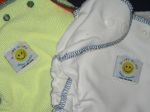Babies need a lot of stuff. Clothing. Bottles. Toys. Diapers. It’s expensive. It produces a lot of waste. As we all know, there is a macro-social trend of couples choosing more natural lifestyle alternatives, including childbirth and childrearing. More people are choosing midwives over doctors. More people are choosing breastfeeding over bottle-feeding. Are more people choosing cloth diapers over disposable diapers?
I can unequivocally and confidently state that dirty diapers are gross. I have nieces and nephew. I have a ton of cousins. I’m fully aware. I care about the environment; I know disposable diapers are bad for it. But still, the last thing I want to do is wash a dirty diaper – gross.
Enter Happy Nappy.
When the Happy Nappy team visited Dragons Den, they left empty handed: the dragons didn’t believe their services were needed. Operating with a product in an industry that will exist as long as babies are born, Happy Nappy has seen growing success. They meet parents’ demands for keeping babies dry and comfortable in an environmentally sustainable way – and the Happy Nappy team does all the work.
 Happy Nappy manufactures cloth diapers, delivering a fresh batch to customers’ houses weekly and removing the previous week’s dirty diapers to be laundered at their warehouse. Aware of the concerns many have over chemicals in cleaning supplies, Happy Nappy’s laundering process is certified phosphate free, chlorine-less, and balances pH levels to match a baby’s skin pH level. They even go as far as to only use cold-water detergents, further minimizing their environmental impact. Their goal is to use a laundering process that is environmentally and – more importantly – baby friendly. Did I mention that overall, it’s also cheaper to use cloth diapers?
Happy Nappy manufactures cloth diapers, delivering a fresh batch to customers’ houses weekly and removing the previous week’s dirty diapers to be laundered at their warehouse. Aware of the concerns many have over chemicals in cleaning supplies, Happy Nappy’s laundering process is certified phosphate free, chlorine-less, and balances pH levels to match a baby’s skin pH level. They even go as far as to only use cold-water detergents, further minimizing their environmental impact. Their goal is to use a laundering process that is environmentally and – more importantly – baby friendly. Did I mention that overall, it’s also cheaper to use cloth diapers?
 Happy Nappy isn’t available everywhere. In fact, there are only franchises servicing select parts of British Columbia, Alberta, Ontario, and Saskatchewan. However, with a growing consumer demand for environmentally friendly alternatives, it is possible that there will be increased growth of Happy Nappy.
Happy Nappy isn’t available everywhere. In fact, there are only franchises servicing select parts of British Columbia, Alberta, Ontario, and Saskatchewan. However, with a growing consumer demand for environmentally friendly alternatives, it is possible that there will be increased growth of Happy Nappy.
Some “fun facts” that may encourage parents to use services like Happy Nappy instead of disposable diapers: the average disposable diaper will stay in a landfill for approximately 500 years. Over 4 million diapers are disposed of per day in Canada. That is a whole lot of waste being added to the landfill. Cloth diapers are admittedly not the right choice for every parent, just as a midwife and breastfeeding aren’t the right choice for every person. It’s simply an alternative, one with considerable environmental benefits compared to the disposable alternative.

